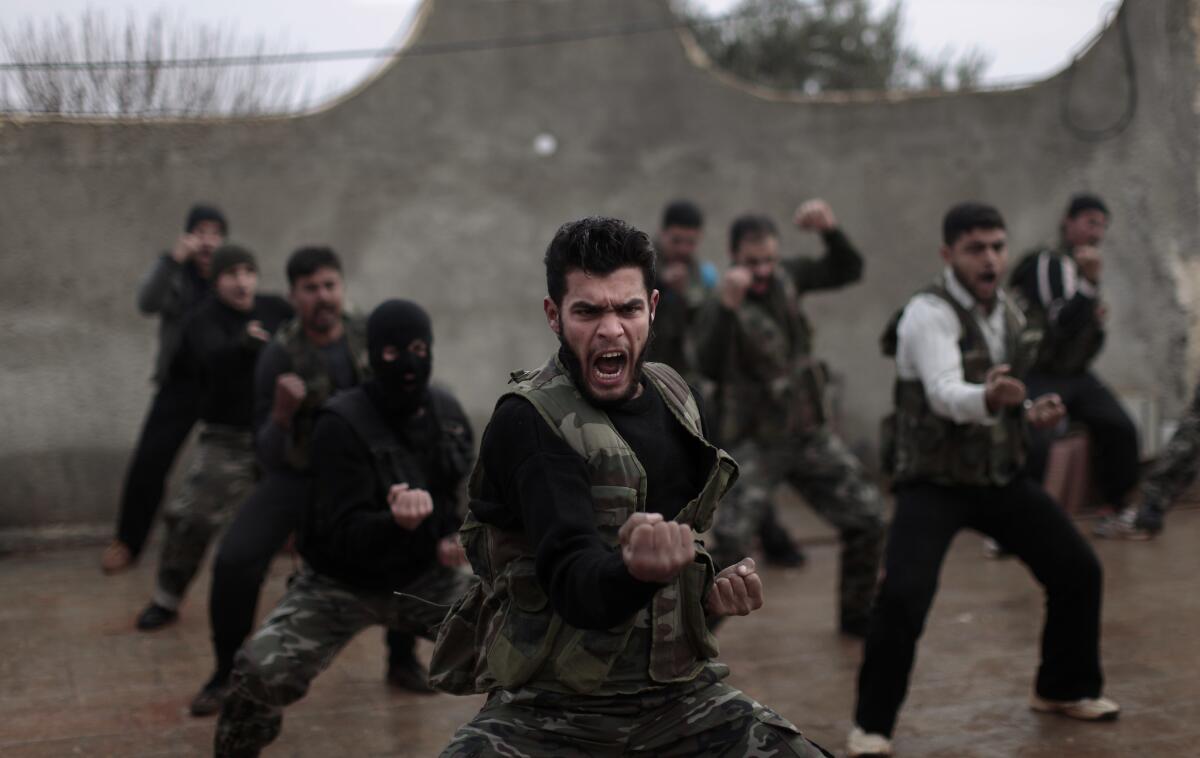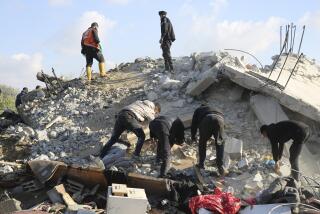McManus: Inching toward Syria

Military intervention in the Muslim world seems to bring the United States nothing but grief. Afghanistan, Iraq, Libya: None looks much like a success story now.
Yet the Obama administration is edging reluctantly into a civil war in Syria, aiding rebels who are fighting to overthrow the brutal regime of Bashar Assad. And it should: The longer this war goes on, the worse it will be for the U.S. and the Syrians. Already, more than 70,000 Syrians have died; perhaps 4 million have lost their homes. The arguments against intervention are eroding fast.
Why? Because all the alternatives are worse.
At the moment, Syria’s opposition is a mess. Last week, the U.S.-backed president of the rebels’ governing council, the Syrian National Coalition, suddenly resigned, complaining that he was being undercut by the more radical Muslim Brotherhood. One side in that squabble (the moderate, Moaz Khatib) was backed by Saudi Arabia, the other (the Muslim Brotherhood) by the rival Persian Gulf emirate of Qatar. Both countries have won influence among the rebels by providing money and weapons. The United States, caught in the middle, has been trying to broker a reconciliation, but without the helpful currency of arms supplies.
U.S. restraint hasn’t succeeded in stopping the war; it’s merely made it more difficult to organize the opposition. Syria’s neighbors — rival Arab states, plus Turkey — have funneled aid to their favorite rebel factions; that’s been a recipe for division, not success.
Meanwhile, on the ground, the radical Islamist Al Nusra Front, an offshoot of Al Qaeda’s affiliate in Iraq, has won a reputation as the most effective fighting force on the rebel side, a record that’s helping it attract recruits. So the stakes for the United States in this conflict are high. Syria is surrounded by countries that are important to the U.S.: Turkey, Israel, Jordan, Lebanon and Iraq. A long sectarian civil war in Syria could spill over into any of them
A war that ends with restoration of the Assad regime would be a triumph for Iran and a disaster for the United States. A war that ends with a victory for Al Nusra would be even worse.
That’s why the Obama administration is still trying to prod the regime and the rebels toward a negotiated truce that would remove Assad from power. But neither side appears ready to negotiate.
The administration has taken sides rhetorically, declaring that Assad must go and recognizing the rebels as legitimate players in any new government. It has pledged almost $385 million in humanitarian aid. It has provided communications equipment and training for opposition leaders. And according to recent reports, U.S. intelligence agencies have provided carefully chosen rebel units with military intelligence and training, and helped arrange weapons shipments from suppliers such as Saudi Arabia and Qatar.
One problem with that kind of quiet assistance: Most Syrians don’t know about it. Even the most public part of the program, humanitarian aid, doesn’t carry “Made in USA” labels. “Everybody [in Syria] asks … ‘Why aren’t they helping us?’” Tom Malinowski of Human Rights Watch told a House committee last week. “And that anger was directed particularly at the United States.”
The arguments against doing more in Syria are familiar. We don’t want to close off the possibility of negotiations. Military aid might prolong the war. We can’t be sure that aid won’t fall into the wrong hands. It might be a slippery slope toward putting boots on the ground. And we’re tired, so tired, of wars in the Muslim world.
But at this point, military aid to the rebels is more likely to push the government toward negotiations, not foreclose that possibility. Military aid could shorten the war. Yes, weapons could fall into the wrong hands, but that’s an argument against providing surface-to-air missiles, not rifles and ammunition.
Most important, aid doesn’t need to turn into a slippery slope. In the 2011 intervention in Libya, Obama sent U.S. Air Force jets and Navy ships to war, but drew a line against putting boots on the ground, and that line held.
It’s true that Libya didn’t come out well. (What were you expecting, Switzerland?) Today’s complaints about Libya forget the alternative at the time: air and tank attacks by Moammar Kadafi against his own cities, just as Assad is doing in Syria.
Obama has inched toward more direct intervention. Administration officials have considered options ranging from arms shipments to a U.S.-enforced no-fly zone and attacks on Syria’s air force. But action has been agonizingly slow. It looks as if the president wants to make it clear that, whatever he does, it wasn’t his first preference.
Last week, at a news conference during his visit to the Middle East, he complained about the no-win side of his job. If the United States “goes in militarily, then it’s criticized for going in militarily,” he said, “and if it doesn’t go in militarily, then people say, ‘Why aren’t you doing something militarily?’”
The president’s peevishness is understandable; he doesn’t need another headache, let alone another war. But indecision is not leadership. It’s not even leading from behind. We need to be doing more.
Follow Doyle McManus on Twitter @DoyleMcManus
More to Read
A cure for the common opinion
Get thought-provoking perspectives with our weekly newsletter.
You may occasionally receive promotional content from the Los Angeles Times.







